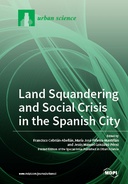Explore

Land Squandering and Social Crisis in the Spanish City
0 Ungluers have
Faved this Work
Login to Fave
The last two decades have been marked by intense and accelerated economic, political, and cultural processes that have affected urban spaces. These changes have occurred in different parts of cities (traditional centers, edges, peripheries) and at different levels of the urban system (large and medium-sized cities and in their respective areas of influence). Possibly the clearest expression of the spatial effects on cities can be perceived in their morphological transformations, their territorial dimensions, or in their social problems. Until 2008, urban–territorial processes were a reflection of the logic and inconsistencies of an expansive economic context and of a structural context that favored the development of cities through concurrent processes and actors. As a result, the built land and amount of urbanized and built surfaces increased, together with processes of the expansion and modernization of cities. Since 2008, the expansive economic cycle has ended, and there have been diverse negative consequences. Notably, the construction sector has come to an abrupt halt. Access to credit has also been reduced, and unemployment has increased. The economic recession has caused sociodemographic and socioeconomic issues exemplified by housing vulnerability, with dispossession, evictions, a shortage of social housing, and energy poverty.
This book is included in DOAB.
Why read this book? Have your say.
You must be logged in to comment.
Rights Information
Are you the author or publisher of this work? If so, you can claim it as yours by registering as an Unglue.it rights holder.Downloads
This work has been downloaded 304 times via unglue.it ebook links.
- 238 - pdf (CC BY-NC-ND) at Unglue.it.
Keywords
- airbnb
- Alicante
- Barcelona
- Barcelona Metropolitan Region
- Cabanyal
- consumption
- counter-urbanization
- dispersed urbanism
- eco-neighborhood
- economic crisis
- educational level
- eviction
- expansive city planning
- Extremadura
- financialization
- foreclosure
- foreign immigration
- holiday home
- housing bubble
- housing market
- housing vulnerability
- illegal urbanization
- land squandering
- land uses
- Madrid
- medium-size cities
- medium-sized city
- neighbourhood effect
- neoliberal urban policy
- night lights
- periphery
- periurbanization
- post-crisis
- qualitative methodology
- real estate bubble
- Remote sensing
- Residential mobility
- Residential segregation
- residential strategies
- rurbanization
- School choice
- seasonality
- sharing economies
- social crisis
- social housing
- social inequalities
- social-vulnerability
- socio-environmental vulnerability
- Spain
- Spanish city
- Spatial Analysis
- suburbanization
- Suomi NPP VIIRS
- sustainable urban neighborhoods
- über
- urban conflicts
- urban expansion
- urban geography
- urban growth
- Urban inequality
- Urban regeneration
- urban segregation
- urban sprawl
- urban sustainability
- urban vulnerability
- urbanism
- Urbanization
- urbanization process
- Valencia
- vulnerable neighborhoods
- Water
Links
DOI: 10.3390/books978-3-03897-947-0Editions


